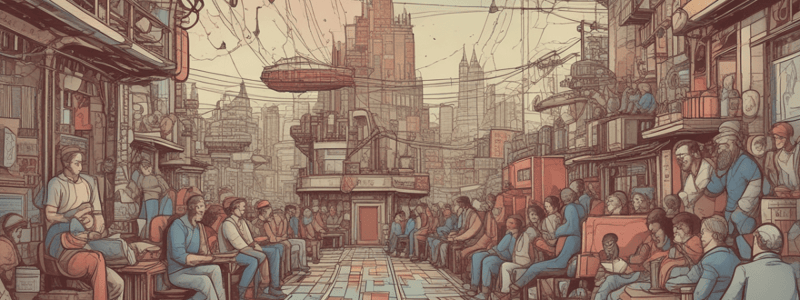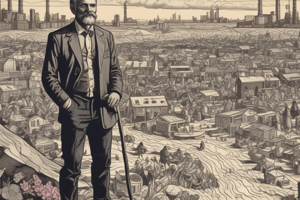Podcast
Questions and Answers
According to the theory presented, what is the primary source of wealth?
According to the theory presented, what is the primary source of wealth?
- Industry
- Labor (correct)
- Nature
- Capital
What did the Mechanics' Union of Trade Associations (Philadelphia, 1827) demand from labor?
What did the Mechanics' Union of Trade Associations (Philadelphia, 1827) demand from labor?
- Elimination of private property
- The total wealth produced
- An equal share of the wealth produced
- A fair and full equivalent for their productive services (correct)
What is the concept of 'congealed labor' referring to?
What is the concept of 'congealed labor' referring to?
- Labor hours worked
- Labor costs
- Labor productivity
- Labor accumulated in machines (correct)
What is the implication of the theory on private property rights?
What is the implication of the theory on private property rights?
What is the main difference between Marx's and the Mechanics' Union of Trade Associations' views on labor and wealth?
What is the main difference between Marx's and the Mechanics' Union of Trade Associations' views on labor and wealth?
What is the underlying principle of economic justice implicit in the theory?
What is the underlying principle of economic justice implicit in the theory?
What is the primary condition for a household to participate in the production of wealth and earn a viable income?
What is the primary condition for a household to participate in the production of wealth and earn a viable income?
What is the main reason labor would not earn a living wage if its value were objectively evaluated?
What is the main reason labor would not earn a living wage if its value were objectively evaluated?
What is the principle that entails a right to produce wealth in a manner consistent with how wealth is being produced?
What is the principle that entails a right to produce wealth in a manner consistent with how wealth is being produced?
What is the implication of contending that men are justly entitled to a living wage?
What is the implication of contending that men are justly entitled to a living wage?
What is the significance of the statement 'men have a right to the continuance of the conditions under which wealth is produced primarily by labor'?
What is the significance of the statement 'men have a right to the continuance of the conditions under which wealth is produced primarily by labor'?
What is the alternative to productive employment of one's own labor power in an industrial economy?
What is the alternative to productive employment of one's own labor power in an industrial economy?
What is the purpose of partnering or having proprietary interests in an industrial economy?
What is the purpose of partnering or having proprietary interests in an industrial economy?
What is the main characteristic of an industrial economy according to the text?
What is the main characteristic of an industrial economy according to the text?
What is the primary factor that determines the greater productiveness of one economy compared to another?
What is the primary factor that determines the greater productiveness of one economy compared to another?
What is the consequence of labor power making a relatively diminishing contribution to production compared to capital instruments?
What is the consequence of labor power making a relatively diminishing contribution to production compared to capital instruments?
What is the relationship between the distributive share paid to capital owners and the productive use of their property?
What is the relationship between the distributive share paid to capital owners and the productive use of their property?
What is the primary role of labor unions in the context of wealth distribution?
What is the primary role of labor unions in the context of wealth distribution?
What is the key assumption underlying the comparison between Alpha and Beta economies?
What is the key assumption underlying the comparison between Alpha and Beta economies?
What is the implication of laborers receiving a small share of the total wealth produced?
What is the implication of laborers receiving a small share of the total wealth produced?
What is the role of government in the context of wealth distribution?
What is the role of government in the context of wealth distribution?
What is the primary goal of laborers in the context of wealth distribution?
What is the primary goal of laborers in the context of wealth distribution?
What is the limitation of the principle of distributive justice in the context of an unjust economy?
What is the limitation of the principle of distributive justice in the context of an unjust economy?
What is the condition required for distributive justice to be operative in an economy?
What is the condition required for distributive justice to be operative in an economy?
What is the significance of the concentration of ownership of labor power by a small class of slave owners?
What is the significance of the concentration of ownership of labor power by a small class of slave owners?
What is the primary focus of the principles of justice?
What is the primary focus of the principles of justice?
What is the implication of the principle of distributive justice in an unjust economy?
What is the implication of the principle of distributive justice in an unjust economy?
What is the significance of the ownership of means of production by a small class of slave owners?
What is the significance of the ownership of means of production by a small class of slave owners?
What is the significance of the primary distribution of wealth?
What is the significance of the primary distribution of wealth?
What is the relationship between the principle of distributive justice and the unjust economy?
What is the relationship between the principle of distributive justice and the unjust economy?
What is the underlying principle of justice with respect to the use of common knowledge in production?
What is the underlying principle of justice with respect to the use of common knowledge in production?
What is the significance of the domestication of animals in the context of production?
What is the significance of the domestication of animals in the context of production?
What is the primary purpose of a system of universal, free public schooling?
What is the primary purpose of a system of universal, free public schooling?
What is the consequence of society and the state ensuring equal opportunities for all to acquire knowledge?
What is the consequence of society and the state ensuring equal opportunities for all to acquire knowledge?
What is the primary distinction between justice and rank injustice in the context of production?
What is the primary distinction between justice and rank injustice in the context of production?
What is the implication of the statement that the production of wealth is a current activity for a current result?
What is the implication of the statement that the production of wealth is a current activity for a current result?
What is the significance of the example of spoiled food being poisonous?
What is the significance of the example of spoiled food being poisonous?
What is the primary obligation of society and the state with respect to the distribution of wealth?
What is the primary obligation of society and the state with respect to the distribution of wealth?
What is the primary implication of a man's right to life in terms of acquiring subsistence?
What is the primary implication of a man's right to life in terms of acquiring subsistence?
What is the fundamental difference between a chattel slave and a person who cannot find employment?
What is the fundamental difference between a chattel slave and a person who cannot find employment?
What is the underlying principle of the 'right to a living wage'?
What is the underlying principle of the 'right to a living wage'?
What is the primary condition necessary for a person to earn a living wage?
What is the primary condition necessary for a person to earn a living wage?
What is the primary implication of a person being unable to use their labor power to participate in the production of wealth?
What is the primary implication of a person being unable to use their labor power to participate in the production of wealth?
What is the primary difference between a person who has a right to earn a living wage and a person who is given subsistence?
What is the primary difference between a person who has a right to earn a living wage and a person who is given subsistence?
What is the primary implication of a person's right to life in terms of their property?
What is the primary implication of a person's right to life in terms of their property?
What is the primary condition necessary for a person to have a just claim upon a share in the distribution of wealth?
What is the primary condition necessary for a person to have a just claim upon a share in the distribution of wealth?
What is the primary basis of human coexistence according to W. Stark's essay?
What is the primary basis of human coexistence according to W. Stark's essay?
What happens when the state of automated production reaches a certain point?
What happens when the state of automated production reaches a certain point?
What is required for a large number of households to participate in production?
What is required for a large number of households to participate in production?
What is the implication of asserting that every man has a right to obtain his living by earning it?
What is the implication of asserting that every man has a right to obtain his living by earning it?
What is the relationship between a sin against justice and the social bond?
What is the relationship between a sin against justice and the social bond?
What is the primary role of charity in the context of wealth distribution?
What is the primary role of charity in the context of wealth distribution?
What is the primary difference between a sin against justice and a sin against charity?
What is the primary difference between a sin against justice and a sin against charity?
What is the primary condition for pre-industrial workers to earn a living wage?
What is the primary condition for pre-industrial workers to earn a living wage?
What is the key concept that Marx uses to solve the problem of commensurating qualitatively different commodities?
What is the key concept that Marx uses to solve the problem of commensurating qualitatively different commodities?
What is the primary objective of Aristotle's principle of justice in exchange?
What is the primary objective of Aristotle's principle of justice in exchange?
What is the main limitation of Aristotle's analysis of commensurating qualitatively different commodities?
What is the main limitation of Aristotle's analysis of commensurating qualitatively different commodities?
What is the title of the book where Marx discusses the concept of value?
What is the title of the book where Marx discusses the concept of value?
What is the chapter and section where Marx quotes Aristotle's discussion of commensurating qualitatively different commodities?
What is the chapter and section where Marx quotes Aristotle's discussion of commensurating qualitatively different commodities?
What is the main difference between Marx's and Aristotle's understanding of value?
What is the main difference between Marx's and Aristotle's understanding of value?
What is the implication of Marx's solution to the problem of commensurating qualitatively different commodities?
What is the implication of Marx's solution to the problem of commensurating qualitatively different commodities?
What is the key concept that Aristotle recognizes as lacking in his analysis of commensurating qualitatively different commodities?
What is the key concept that Aristotle recognizes as lacking in his analysis of commensurating qualitatively different commodities?
Flashcards are hidden until you start studying
Study Notes
Labor Theory of Value
- Labor, either in the form of living labor or "congealed labor" (i.e., labor accumulated in machines), contributes to the production of wealth, except for what nature provides.
- According to this theory, everything produced would belong to labor as a matter of just requital.
Early Labor Movement
- In 1827, the Preamble of the Mechanics' Union of Trade Associations declared that labor is the source of all wealth, but they asked only for an equitable share of it, rather than demanding all the wealth produced.
- They believed that laborers have a natural and unalienable right to reap the fruits of their own industry and should have an equal participation in the wealth produced.
Industrial Economy
- If an industrial economy (Alpha) is compared to a non-industrial economy (Beta), Alpha will produce more wealth annually, but the contribution of labor will be no greater in Alpha than in Beta.
- The greater productiveness of one economy can be attributed to labor only if one economy employs more man power or has a difference in average skill or strength.
Distribution of Wealth
- In an advanced industrial economy, labor may not earn a living wage if its contribution is justly requited, as most of the wealth is produced by capital and the ownership of capital is concentrated.
- Laborers may need to use labor unions and government support to obtain a reasonable subsistence or decent standard of living.
- If laborers receive more than they have justly earned, the distributive share paid to the owners of capital must be less.
Right to a Living Wage
- To contend that men are justly entitled to a living wage is equivalent to saying that men have a right to the continuance of conditions under which wealth is produced primarily by labor, which is not a valid right.
- The right to earn a viable income is through effective participation in the production of wealth, taking advantage of the existing state of technology.
Participation in Wealth Production
- In an industrial economy, there are two basic ways to participate in the production of wealth: through the productive employment of one's own labor power or through the productive employment of capital instruments in which one has property.
- Households can also participate in production through combinations of these two means.
Aristotle's Principle of Justice in Exchange
- Aristotle's principle of justice in exchange requires that the things exchanged be of equal value
- He recognized that qualitatively different commodities cannot be equated unless they can be made commensurable
- Aristotle believed that there is no objective and common measure of exchange value, which barred the way to further analysis
Marx's Solution
- Marx offers a solution to the problem of commensurability by proposing the labor theory of value
- According to Marx, the objective and common measure of exchange value is human labor
- Two qualitatively different things can be made commensurable by measuring them by the amount of human labor involved in their production
Principle of Distributive Justice
- The principle of distributive justice requires that the wealth produced be distributed according to the contribution made to its production
- In a pre-industrial slave economy, distributive justice might be operative, but the economy would still be unjust in other respects
- Distributive justice would still be done if the slave owners received the major share of the wealth produced because they owned the means of production
Right to Life and Subsistence
- The right to life involves more than a right not to be murdered or maimed; it involves a right to acquire subsistence by rightful means
- The right to life is meaningless unless it involves a right to earn a living through one's own labor
- The right to earn a living is a fundamental right that is complementary to the right to produce wealth
Conditions Under Which a Man's Right to Subsistence is Denied
- There are two conditions under which a man's right to subsistence is denied:
- Slavery, in which a man lacks any property through which he can participate in the production of wealth
- Unemployment, in which a man is unable to use his labor power to participate in the production of wealth and earn a living
Charity and Justice
- Charity should become operative only after every step has been taken to see that justice is done, and every rightful claim is requited
- Justice is the very basis of human coexistence, an indispensable precondition, whereas charity is an embellishment
- A sin against justice is a more serious affair than a sin against charity
Studying That Suits You
Use AI to generate personalized quizzes and flashcards to suit your learning preferences.



